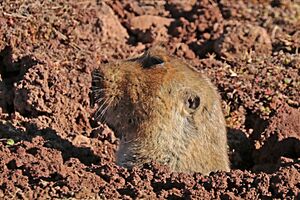Big-headed African mole-rat facts for kids
Quick facts for kids Big-headed african mole rat |
|
|---|---|
 |
|
| Sanetti Plateau, Ethiopia | |
| Conservation status | |
| Scientific classification |
|
| Kingdom: | Animalia |
| Phylum: | Chordata |
| Class: | Mammalia |
| Order: | Rodentia |
| Family: | Spalacidae |
| Genus: | Tachyoryctes |
| Species: |
T. macrocephalus
|
| Binomial name | |
| Tachyoryctes macrocephalus Rüppell, 1842
|
|
| Script error: The function "autoWithCaption" does not exist. | |
| Synonyms | |
|
Tachyoryctes hecki Neumann & Rümmler 1928 |
|
Script error: No such module "Check for conflicting parameters".
The big-headed African mole rat (Tachyoryctes macrocephalus) is a unique rodent species. It is sometimes called the giant root-rat or Ethiopian African mole rat. This amazing animal is known for its large size, especially its head! It lives in high-altitude grasslands and is an important part of its ecosystem. Sadly, its home is shrinking, making it an endangered species.
Contents
Meet the Big-Headed Mole Rat
These mole rats are easy to spot because of their large size. Their heads are especially big compared to their bodies. They have soft fur that is a mix of golden and brown colors.
Where Do They Live?
The big-headed African mole rat lives only in the Bale Mountains of Ethiopia. This means it is an endemic species. Its natural home is in high-altitude grassland areas. These are places high up in the mountains that are covered in grass. In some areas, you can find many of them, with up to 2,600 mole rats living in just one square kilometer!
What Do They Eat and How Do They Find Food?
Unlike some other mole rats, this species mostly finds its food above ground. It digs a new tunnel to reach a patch of plants. Then, it eats the grasses and herbs around its tunnel for about 20 minutes. Once the food is gone, it blocks the tunnel from the inside. While it mostly eats plants above ground, some mole rats prefer to eat roots.
Staying Safe from Predators
Even though they eat above ground, big-headed mole rats keep their digging skills. This is because they face constant danger from predators. Their main predator is the Ethiopian wolf (Canis simensis). This wolf is very good at hunting mole rats.
Ethiopian wolves often wait for a mole rat to dig a new foraging tunnel. When the mole rat comes out, the wolf tries to catch it. If the mole rat runs back into its tunnel, the wolf will wait patiently for it to reappear.
These mole rats have also developed other ways to protect themselves. They are very cautious and careful. They also have large incisors (front teeth) that can cause serious injury to animals that try to attack them.
 | Delilah Pierce |
 | Gordon Parks |
 | Augusta Savage |
 | Charles Ethan Porter |


